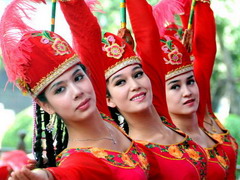Hong Kong will always be part of China
By Eric Sommer (China Daily) Updated: 2014-06-25 07:10A large number of Hong Kong residents are taking part in an informal - mainly Internet-based - poll to "determine" whether they want to have a more direct say in nominating candidates for the post of Hong Kong's "chief executive" in future elections. More than 700,000 Hong Kong residents had voted until the third day of the 10-day "referendum" organized by "Occupy Central" forces.
The central government agrees to universal suffrage in future Hong Kong elections, but has denounced the poll as "illegal" and "invalid", and emphasized that "the high degree of autonomy of the Hong Kong Special Administration Region is not full autonomy, nor a decentralized power ... the Hong Kong people who govern Hong Kong should above all be patriotic."
The poll, which some people refer to as an "informal referendum", is part of a growing wave of both officially sanctioned and informal referendums, some of them Internet-based, in many countries. Venice has just held an online unofficial "referendum" on separating from Italy; the recent referendum in Crimea resulted in the region seceding from Ukraine and rejoining Russia; and Scotland is scheduled to hold an official referendum on Sept 18 on possible independence from the United Kingdom.
But there is one arresting difference between the unofficial Hong Kong poll and many of the others that have been held or will be held in other countries. Some Hong Kong people may even try to seek independence through the poll, but more are only concerned with how candidates for elections are nominated. So the majority of Hong Kong people want to be part of China.
It is natural for people of a country to have different opinions on social, political, and economic issues. But whatever grievances some Hong Kong people may have, they appear to fully recognize the substantial benefits of being an integral part of the Chinese nation. To begin with, Hong Kong people are, for the most part, Chinese. So there is strong cultural affinity with China as a whole.
Second, some Hong Kong residents may be uncomfortable with the present state of democratic development in the SAR, but they should know that there was not even a pretense of democracy from 1841-1997 when the UK ruled Hong Kong as a colony. In fact, in the 1960s and the 1970s, Hong Kong residents held large-scale and serious anti-British demonstrations - which sometimes led to riots - against the lack of democratic rights under British rule. The era of democracy in Hong Kong began only when it was reunited with the motherland.
The Western media conveniently forget a vital fact when reporting on Hong Kong - that it was the central government that initiated Hong Kong into the modern democratic era.











